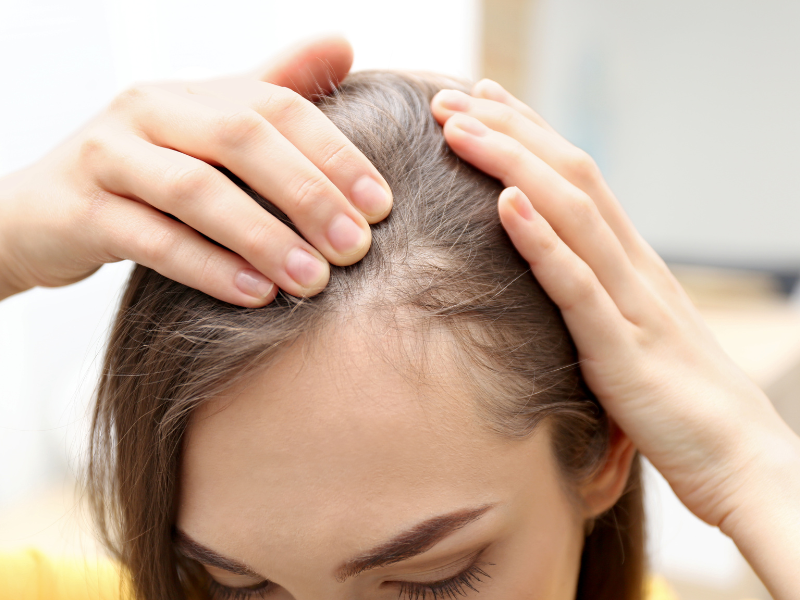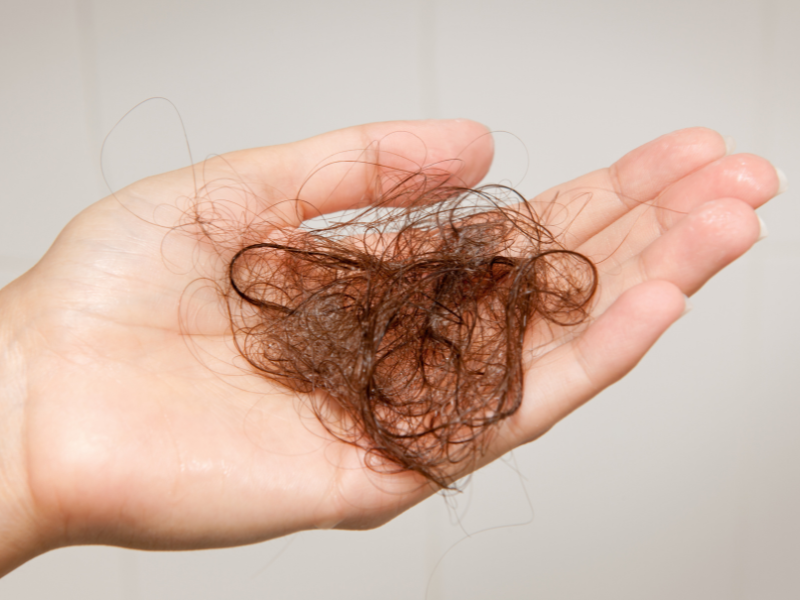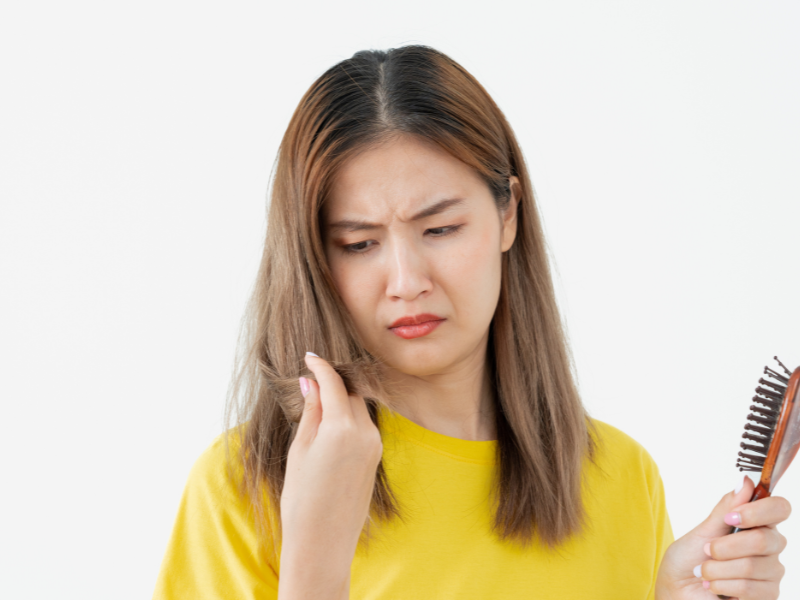Hair fall, also known as male pattern baldness or androgenic alopecia, is a common issue that affects people of all genders and age groups. It can be caused by various factors, including alopecia areata, which results in the loss of hairs. Whether you’re a man or a woman, experiencing hair loss, such as androgenic alopecia or alopecia areata, can be a distressing ordeal, impacting not only your physical appearance but also your self-esteem and overall confidence. Male pattern baldness and the loss of hairs can have a significant effect on how you feel about yourself.
Fortunately, there exist well-established treatments for pattern baldness and alopecia areata to combat hair fall and promote regrowth. In this comprehensive article, we will delve into the various causes of hair fall, including alopecia and pattern baldness. We will explore preventative measures for hair loss, such as addressing psoriasis. Additionally, we will introduce a groundbreaking hair growth laser treatment known as Fotona, which has gained significant popularity for its ability to promote regrowth.
Genetics: The Role of Family History
 One of the leading causes of hair fall is genetics, which can result in baldness or alopecia. Other factors such as psoriasis can also contribute to hair loss. If your family has a history of baldness or alopecia, there’s a higher likelihood that you may inherit this condition.
One of the leading causes of hair fall is genetics, which can result in baldness or alopecia. Other factors such as psoriasis can also contribute to hair loss. If your family has a history of baldness or alopecia, there’s a higher likelihood that you may inherit this condition.
Causes of hair loss can also include psoriasis. Male pattern baldness and female pattern baldness are common genetic causes of hair loss, also known as alopecia. These conditions can affect people of all genders, leading to the loss of hair.
However, there are treatments available that can help with hair regrowth for those experiencing alopecia. In cases of alopecia, hair follicles become sensitive to dihydrotestosterone (DHT), a hormone that causes the shrinkage of hair follicles and eventual hair loss. This information is crucial for understanding regrowth and the underlying cause.
Hormonal Imbalances: Disrupting the Hair Growth Cycle
Hormonal imbalances can wreak havoc on your hair. Conditions such as polycystic ovary syndrome (PCOS) and thyroid disorders can cause alopecia, resulting in hair loss. Hormonal fluctuations during pregnancy and menopause can also disrupt the normal hair growth cycle and hinder regrowth. These imbalances can cause excessive hair loss and thinning in people, but there is hope for regrowth.
Poor Nutrition: The Impact of Diet
Diet plays a pivotal role in hair health. A diet deficient in essential nutrients like iron, protein, and vitamins such as Biotin (B7) and Vitamin D can cause hair loss in people. Weak, brittle hair that is prone to falling out can be a result of this deficiency. However, with proper nutrition, hair regrowth is possible. Additionally, crash diets and extreme calorie restrictions can cause hair loss in people, but there is hope for regrowth.
Stress: A Silent Culprit
Stress can cause hair loss in people, but there is hope for regrowth. Chronic stress can cause hair loss, leading to a condition known as telogen effluvium, where a significant amount of hair enters the shedding phase simultaneously. This disruption in the hair growth cycle can hinder regrowth. Managing stress through relaxation techniques and self-care is crucial for preventing stress-related hair loss. These techniques can help promote regrowth and address the underlying causes of hair loss.
Scalp Conditions: The Importance of Scalp Health
A healthy scalp is vital for robust hair growth. Conditions like dandruff, psoriasis, and dermatitis can cause inflammation and itching, leading to excessive hair loss. This can hinder regrowth. Maintaining good scalp hygiene and promptly treating these conditions can help prevent hair loss and promote regrowth.
Overstyling and Heat Damage: Tread Carefully
Excessive use of hair styling tools, such as straighteners, curling irons, and hair dryers, can lead to hair loss and weaken the hair shaft over time (loss, et al). Additionally, tight hairstyles like ponytails and braids can cause hair loss due to the stress they put on the hair, leading to breakage and hair fall. It’s essential to use these tools sparingly to prevent hair loss and opt for hairstyles that don’t pull on the hair follicles.
Chemical Treatments: Be Cautious
Chemical treatments like perms, relaxers, and harsh hair dyes can weaken the hair shaft and lead to hair loss. If you regularly subject your hair to treatments that can cause loss, it’s crucial to give your hair time to recover and consider gentler alternatives.
Preventing Hair Fall: Strategies to Maintain Healthy Hair
 Nutrient-Rich Diet: The Foundation of Healthy Hair
Nutrient-Rich Diet: The Foundation of Healthy Hair
Maintaining a balanced diet rich in vitamins, minerals, proteins, and essential for preventing hair loss. Include foods like eggs, lean meats, nuts, leafy greens, and fruits in your daily meals to combat thinning hair, noticeable hair loss, hair shedding, and permanent hair loss. Supplements like biotin and iron can also be beneficial for thinning hair, noticeable hair loss, hair shedding, and hereditary hair loss if you have deficiencies.
Scalp Care: Nourishing Your Roots
A clean and well-nourished scalp is crucial for preventing hair loss and promoting healthy hair growth. Regularly wash your hair with a mild shampoo to prevent hair loss, and consider using a conditioner to keep your hair moisturized, et al. Massaging your scalp can also stimulate blood flow to the hair follicles, promoting growth and preventing hair loss.
Stress Management: Finding Inner Balance
Engage in stress-reduction activities like yoga, meditation, and deep breathing exercises to help with thinning hair, pattern hair loss, hair follicle health, et al. Reducing stress levels can help prevent stress-induced hair loss.
Avoid Overstyling: Protecting Your Tresses
Limit the use of heated styling tools to minimize hair loss and damage to the hair follicle, and opt for heat protectant products when you do use them, et al. Choose loose hairstyles that don’t pull on the hair, reducing the risk of breakage and hair loss, et al.
Gentle Hair Care: Choosing the Right Products
Select hair care products that are gentle and suitable for your hair type to prevent hair loss. Avoid shampoos and conditioners containing harsh chemicals. Be mindful of excessive brushing, as it can lead to hair loss and damage.
Professional Hair Treatments: Fotona Hair Growth Laser
For those experiencing hair loss, Fotona hair growth laser therapy offers a promising option for advanced hair restoration solutions. This treatment has gained popularity globally.
Introducing Fotona Hair Growth Laser
 Fotona hair growth laser is a cutting-edge, non-invasive treatment for hair restoration that has gained popularity for its remarkable results in preventing hair loss. This innovative procedure utilizes advanced laser technology to stimulate hair follicles and promote hair growth, effectively addressing hair loss.
Fotona hair growth laser is a cutting-edge, non-invasive treatment for hair restoration that has gained popularity for its remarkable results in preventing hair loss. This innovative procedure utilizes advanced laser technology to stimulate hair follicles and promote hair growth, effectively addressing hair loss.
How Fotona Hair Growth Laser Works
The Fotona hair growth laser treatment is an effective solution for hair loss based on low-level laser therapy (LLLT). It operates by emitting a low-power laser light directly onto the scalp to treat hair loss. This laser light stimulates hair follicles, increasing blood flow and nutrient delivery to promote hair growth. It is especially effective for individuals experiencing hair loss. The enhanced blood circulation helps rejuvenate dormant hair follicles, encouraging them to produce healthier and thicker hair, which can help combat hair loss.
Advantages of Fotona Hair Growth Laser
Non-Invasive: Fotona hair growth laser is a non-invasive and painless option for those seeking hair restoration, providing comfort and minimizing loss.
Minimal Downtime: Unlike surgical hair transplant procedures, Fotona laser treatment minimizes loss and requires little to no downtime, allowing patients to resume their regular activities immediately.
Effective: Many individuals who have undergone Fotona hair growth laser treatment have reported significant improvements in hair growth and reduction in hair loss, with results often visible within a few months.
Suitable for All Hair Types and Loss: Fotona laser therapy is suitable for both men and women of all hair types and ethnicities, including those experiencing hair loss.
No Side Effects: This hair loss treatment is safe and does not have any known side effects, making it an attractive option for individuals concerned about potential risks.
| Aspect | Details |
| Causes of Hair Loss | Genetics, hormonal imbalances, poor nutrition, stress, scalp conditions, overstyling, and chemical treatments. |
| Preventative Measures | Maintain a nutrient-rich diet, practice good scalp hygiene, manage stress, avoid overstyling, and use gentle hair care products. |
| Fotona Hair Growth Laser | A non-invasive laser treatment that stimulates hair follicles, promotes hair growth, and improves blood circulation. |
| Benefits of Fotona Laser | Painless, minimal downtime, suitable for all hair types, no side effects, and effective in reducing hair loss. |
Frequently Asked Questions (FAQs) About Hair Loss and Fotona Hair Growth Laser Treatment
What causes hair loss, and how can I prevent it?
Hair loss can be caused by a variety of factors, including genetics, hormonal imbalances, poor nutrition, stress, scalp conditions, and excessive styling. To prevent hair loss, maintain a nutrient-rich diet, practice good scalp hygiene, manage stress, avoid overstyling, and use gentle hair care products. If hair loss persists, consulting a dermatologist for a tailored treatment plan is recommended.
How does Fotona Hair Growth Laser treatment work?
Fotona Hair Growth Laser treatment uses low-level laser therapy (LLLT) to stimulate hair follicles, increase blood circulation, and promote hair regrowth. The laser energy penetrates the scalp, encouraging dormant hair follicles to become active and produce thicker, healthier hair. This non-invasive procedure enhances nutrient delivery to the scalp, improving overall hair density.
Is Fotona Hair Growth Laser safe, and are there any side effects?
Yes, Fotona Hair Growth Laser is a safe and non-invasive treatment for hair loss. Unlike surgical hair restoration procedures, it does not involve incisions, scarring, or downtime. The treatment has no known side effects, making it a suitable option for both men and women looking for an effective and painless hair regrowth solution.
How many sessions of Fotona Hair Growth Laser are needed to see results?
The number of sessions required depends on the severity of hair loss and individual response to the treatment. Typically, patients undergo multiple sessions spaced a few weeks apart, with noticeable improvements in hair density and growth within three to six months. For optimal and long-lasting results, maintenance sessions may be recommended.
Conclusion: Reclaim Your Confidence
Experiencing hair loss can be emotionally challenging, but it’s essential to recognize that effective treatment strategies for hair fall are readily available. Understanding the root causes of hair loss is the first step in addressing the issue of hair fall. By adopting a balanced diet, practicing good scalp hygiene, managing stress, and implementing mindful hair care practices, you can significantly reduce the risk of hair loss.
For those experiencing hair loss and seeking advanced solutions to hair restoration, Fotona hair growth laser therapy presents a promising option. This non-invasive and painless treatment can stimulate hair follicles and promote healthy hair growth, helping you regain your confidence and a lush mane. It is especially effective for individuals experiencing hair loss, as it targets the root cause and encourages regrowth.
Don’t let hair fall hold you back. Explore these proven hair loss treatment strategies and take the first step towards preventing further loss and promoting a head of healthy, vibrant hair. Remember, prevention is key, but innovative solutions like Fotona can provide the extra boost needed to reclaim your crowning glory.

 Nutrient-Rich Diet: The Foundation of Healthy Hair
Nutrient-Rich Diet: The Foundation of Healthy Hair